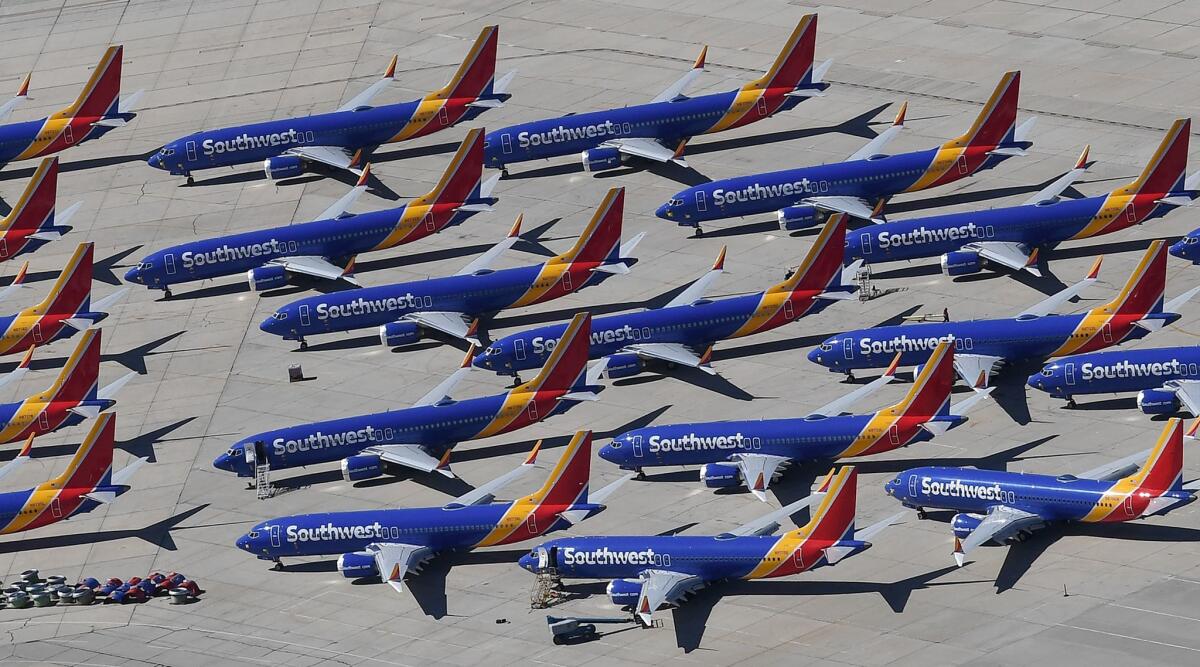Southwest dumps Newark airport as Boeing 737 Max problem continues

- Share via
Fallout from the global ban on Boeing’s 737 Max deepened as American Airlines warned that its profit this year would take a $400-million hit and Southwest Airlines scratched the jet from its schedule into next year.
American Airlines Group Inc. said Thursday that the drag on its annual pretax profit would include a $175-million hit for the second quarter and an expected $125-million penalty in the third.
Meanwhile, Southwest Airlines Co. said caution dictated removing the Max from its schedule through Jan. 5, becoming the first U.S. carrier to drop the grounded aircraft for the rest of this year. The airline also will stop flights at Newark Liberty International Airport near New York City, moving those 20 daily departures to New York’s LaGuardia Airport.
The announcements, made as the carriers reported earnings, came a week after Boeing Co. said it would take a $5.6-billion pretax charge to compensate Max customers. The manufacturer said Wednesday that it might need to halt output of the plane. The narrow-body jet — a fuel-efficient workhorse — was grounded globally in March after two crashes killed 346 people.
American Airlines shares dropped 8.4% on Thursday to $31.67, the most since Dec. 7 and the third-biggest decline on the Standard & Poor’s 500 index. Southwest shares rose less than 1% to $54.91. Boeing shares slid 3.7% to $348.09.
For now, American is keeping its two dozen Max aircraft off its schedule through Nov. 2. “We really don’t have any new information that leads us to make changes,” company President Robert Isom said on a conference call with analysts.
That prediction was met with skepticism, as was a modest increase in American’s 2019 profit forecast. The carrier said adjusted earnings per share would be at least $4.50 and as much as $6 this year. The previous forecast called for no less than $4 at the bottom end.
“Management appears to have confidence in the outlook given lower fuel and solid demand, but investors may question the outlook given Southwest announced it is pulling the Max from its schedules through Jan. 5, 2020,” Helane Becker, a Cowen & Co. analyst, said in a note to clients. “There is potential risk to the outlook if the Max is pulled past Nov. 2” at American.
The Fort Worth company had record sales in the second quarter. But Jamie Baker, an analyst at JPMorgan Chase & Co., questioned American’s continued assurance that it will achieve $1 billion in incremental revenue this year. “We don’t really see it,” Baker said in a report.
There’s a slim silver lining from the grounding. With fewer seats available and high demand for travel, airlines have been able to raise fares and still fill planes.
American said revenue for each seat flown a mile, a gauge of pricing power known as unit revenue, would rise 1% to 3% in the current quarter.
“We’ve looked ahead in future months and are not seeing really anything that would make us concerned at this point around continued strength in domestic demand,” said Don Casey, American’s senior vice president of revenue management.
Boeing has said it expects regulators to let the Max return to service in the fourth quarter.
Southwest accepted that estimate but said it could take two months to get aircraft out of mothballs and comply with any changes ordered by authorities, such as pilot training. The Dallas-based airline previously had pulled the plane from schedules through Nov. 2.
“We want our airplanes. We want to get them as fast as is practical,” Chief Executive Gary Kelly said.
“I would be concerned if there is any additional delay, period. I don’t care what the source of it is,” he said in an interview. As for the possibility Boeing will halt Max production, “I don’t care what they do in the background to manage their business, I just don’t want any further delays.”
Southwest’s chief financial officer, Tammy Romo, said 25 of the 41 remaining Max deliveries scheduled for this year are expected to slip into 2020.
The airline’s operating income was reduced by $175 million last quarter as it parked its 34 Max jets and didn’t receive aircraft on order. The grounding will continue to raise Southwest’s costs as the airline cuts flight and seating capacity this year.
With the Max grounding crimping growth, Southwest made a “tactical decision” to move aircraft from poor-performing Newark to expand in Hawaii and international markets with higher demand, Kelly said.
The extended grounding means Southwest’s flight and seat capacity will shrink this year by 1% to 2%, compared with original plans to expand 5%.
Unit revenue increased 6.8% last quarter and will rise as much as 5% in the current quarter from a year earlier, Southwest said.
“The removal of Max flying through early January 2020 is prudent (others will inevitably follow),” Jamie Baker, an analyst at JPMorgan Chase & Co., said in a note to investors. “The risk remains that the Max doesn’t fully return to revenue service until later in the first quarter of 2020.”
More to Read
Inside the business of entertainment
The Wide Shot brings you news, analysis and insights on everything from streaming wars to production — and what it all means for the future.
You may occasionally receive promotional content from the Los Angeles Times.









